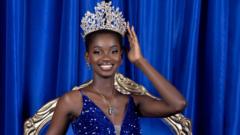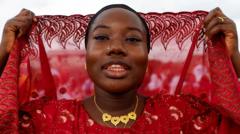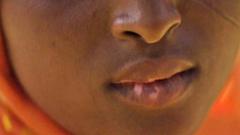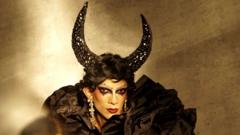Contestants in the Miss Ivory Coast pageant now must compete with their natural hair, sparking both praise and concerns about industry implications.
**Beauty Pageants Embrace Natural Hair; Wigs Banned in Ivory Coast**

**Beauty Pageants Embrace Natural Hair; Wigs Banned in Ivory Coast**
A landmark change in beauty standards aims to showcase authenticity in beauty pageants.
In a revolutionary move for beauty pageants, organizers of Miss Ivory Coast have introduced a ban on wigs, weaves, and hair extensions, urging contestants to showcase their natural beauty. Over the years, the Ivorian beauty scene has been dominated by long-haired, wig-wearing contestants, often mirroring Western beauty ideals. However, Marlène-Kany Kouassi, who won the pageant in 2022 with her short natural hair, marked a turning point for the competition.
Victor Yapobi, president of the organizing committee, stated that the new regulations aim to highlight the natural beauty of Ivorian women. The preliminary contests will now only accept hairstyles that reflect the contestants’ own hair, allowing for braids and straightened natural locks but eliminating artificial enhancements. Yapobi emphasized that cosmetic surgery and skin lightening are already frowned upon within the competition, reinforcing a commitment to authenticity.
This year also saw additional adjustments to the contest eligibility, such as lowering the entrance fee from approximately $80 to $50 and raising the maximum age to 28 years. Such changes respond to feedback from participants who expressed financial strain from previous participation costs.
Contestants have expressed mixed feelings about the new rules. While some, like Emmanuella Dali, embrace the chance to display their natural hair positively, others lament the loss of personal expression associated with wigs. One contestant, Laetitia Mouroufie, reflected on her past beliefs about beauty, stating that her confidence has soared now that she can embrace her authentic self.
The decision to ban wigs has sparked a discussion across the nation, highlighting the cultural significance of hair. For many women in Ivory Coast, wigs serve not only as fashion statements but also as protective hairstyles that help maintain natural hair health.
However, salon owners fear the economic repercussions of this change, as the wig market is notably lucrative. Ivory Coast’s hair industry, worth over $300 million annually, stands to lose significant business and income if preference shifts toward natural hairstyles.
Despite the concerns, beauty experts believe that this new direction might positively influence how African women are perceived both locally and globally. The debate surrounding this change continues, with differing opinions on whether beauty standards should be dictated by pageants or left to individual choice.
The preliminary rounds of the Miss Ivory Coast competition are ongoing, and the eventual outcome may dictate the future trajectory of beauty norms in the region. Yapobi received overwhelming positive feedback regarding the changes and remains hopeful about further encouraging authentic displays of beauty moving forward. The final event is set to take place later this year, providing a significant platform for the contestants to showcase their natural beauty which could inspire a broader acceptance in Ivorian society.
Victor Yapobi, president of the organizing committee, stated that the new regulations aim to highlight the natural beauty of Ivorian women. The preliminary contests will now only accept hairstyles that reflect the contestants’ own hair, allowing for braids and straightened natural locks but eliminating artificial enhancements. Yapobi emphasized that cosmetic surgery and skin lightening are already frowned upon within the competition, reinforcing a commitment to authenticity.
This year also saw additional adjustments to the contest eligibility, such as lowering the entrance fee from approximately $80 to $50 and raising the maximum age to 28 years. Such changes respond to feedback from participants who expressed financial strain from previous participation costs.
Contestants have expressed mixed feelings about the new rules. While some, like Emmanuella Dali, embrace the chance to display their natural hair positively, others lament the loss of personal expression associated with wigs. One contestant, Laetitia Mouroufie, reflected on her past beliefs about beauty, stating that her confidence has soared now that she can embrace her authentic self.
The decision to ban wigs has sparked a discussion across the nation, highlighting the cultural significance of hair. For many women in Ivory Coast, wigs serve not only as fashion statements but also as protective hairstyles that help maintain natural hair health.
However, salon owners fear the economic repercussions of this change, as the wig market is notably lucrative. Ivory Coast’s hair industry, worth over $300 million annually, stands to lose significant business and income if preference shifts toward natural hairstyles.
Despite the concerns, beauty experts believe that this new direction might positively influence how African women are perceived both locally and globally. The debate surrounding this change continues, with differing opinions on whether beauty standards should be dictated by pageants or left to individual choice.
The preliminary rounds of the Miss Ivory Coast competition are ongoing, and the eventual outcome may dictate the future trajectory of beauty norms in the region. Yapobi received overwhelming positive feedback regarding the changes and remains hopeful about further encouraging authentic displays of beauty moving forward. The final event is set to take place later this year, providing a significant platform for the contestants to showcase their natural beauty which could inspire a broader acceptance in Ivorian society.
















